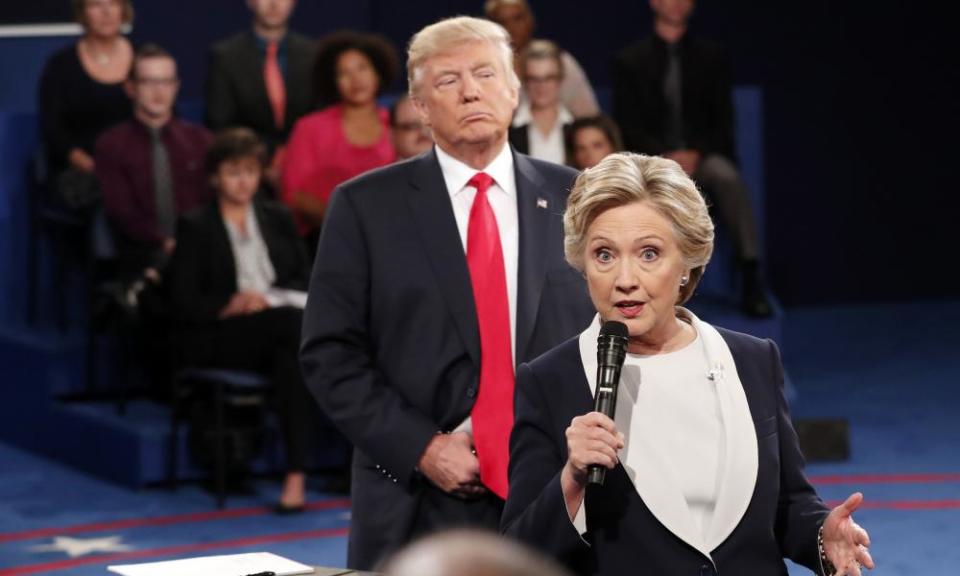Hillary Clinton: Trump inaugural speech was 'cry from the white nationalist gut'
Speaking in her first televised interview since her stunning defeat in the election in November, Clinton says she was ‘gobsmacked’ by Donald Trump’s win

Hillary Clinton on Sunday called Donald Trump’s inaugural speech as president “a cry from the white nationalist gut”.
Clinton was speaking in her first televised interview since her defeat in the election in November, two days before the publication of What Happened, her book about her defeat.
Sitting onstage as Trump was sworn in on 20 January was “an out-of-body experience”, Clinton said, recalling that she attended in the hope of presenting a unified front following an ugly and bitter campaign.
“I’m a former first lady, and former presidents and first ladies show up,” she told CBS This Morning. “It’s part of the demonstration of the continuity of our government. And so there I was, on the platform, you know, feeling like an out-of-body experience. And then his speech, which was a cry from the white nationalist gut…”
Trump’s dark-hued oration famously focused on a vision of “American carnage”, a crime-riddled post-industrial dystopia the new president said only he could fix.
Clinton continued: “What an opportunity [Trump had] to say, ‘OK, I’m proud of my supporters, but I’m the president of all Americans.’ That’s not what we heard at all.”
Clinton addressed everything from her missteps as a candidate to the shock of realizing that she would not become the first female president. She was perhaps most candid in her assessment of Trump’s appeal to “millions of white people”, in opposition to the changing demographics of America.
“He was quite successful in referencing a nostalgia that would give hope, comfort, settle grievances, for millions of people who were upset about gains that were made by others,” Clinton said.
During the campaign, in a moment widely criticized and weaponised by the Trump campaign, Clinton referred to half of Trump’s supporters as a “basket of deplorables”. She expressed regret at the time. On Sunday, Clinton was unapologetic for the context of her remarks and said Trump’s base was “already energized” by his divisive rhetoric before her words became public.
“I thought Trump was behaving in a deplorable manner,” she said. “I thought a lot of his appeals to voters were deplorable.”
She cited the leaked 2005 Access Hollywood tape in which the former reality TV star bragged about groping and kissing women without their consent.
“There were a large number of people who didn’t care,” Clinton said. “It did not matter to them.”
When CBS interviewer Jane Pauley suggested Clinton had offended those who did not “personally feel deplorable”, Clinton disagreed emphatically.
“I don’t buy that,” she said. “I don’t buy that. I’m sorry I gave him a political gift of any kind.”
Published excerpts of Clinton’s memoir have suggested a deeply personal take on a campaign nearly everyone predicted she could not lose. Clinton said on Sunday she was among those who never envisaged a Trump victory.
“I had not drafted a concession speech,” she said. “I’d been working on a victory speech. I just felt this enormous letdown, just kind of loss of feeling and direction and sadness … It was a very hard transition.
“I really struggled. I couldn’t feel, I couldn’t think. I was just gobsmacked, wiped out.”
In the book, Clinton reflects on the factors that led to her defeat. There is a section that criticizes the Vermont senator Bernie Sanders, her rival in the Democratic primaries, for inflicting “lasting damage” on her campaign, and there is regret for not hitting back more forcefully against James Comey, the then FBI director who caused a frenzy 11 days before the election with a letter suggesting a new inquiry into Clinton’s use of personal email.
“The most important of the mistakes I made was using personal email,” Clinton told CBS of her controversial decision as secretary of state to use a private email server. Comey’s letter, she said, “raised the specter that, somehow, the investigation was being reopened”.
“It just stopped my momentum.”
Clinton also emphasized her frustration over the lack of focus on and response to Russian interference during the US election, reports of which were released during the course of the campaign, and Comey’s refusal to draw attention to the investigation of possible ties between the Trump campaign and Moscow.
“You never hear a word about it,” she said. “And when asked later, he goes, ‘Well, it was too close to the election.’ Now, help me make sense of that. I can’t understand it.”
In excerpts published by Vogue on Sunday, Clinton also explained the color of her suit and the tie worn by her husband, former president Bill Clinton, for her concession speech the morning after the election.
“The morning after the election, Bill and I both wore purple. It was a nod to bipartisanship (blue plus red equals purple),” Clinton writes. “The night before, I had hoped to thank the country wearing white – the color of the suffragettes – while standing on a stage cut into the shape of the United States under a vast glass ceiling. Instead, the white suit stayed in the garment bag.”
She also recalls the drive back to her home in Chappaqua, the quiet settlement in northern Westchester County, New York, the day after the election.
“Every few minutes, Bill would repeat what he had been saying all morning: ‘I’m so proud of you,’” Clinton writes. “To that he now added, ‘That was a great speech. History will remember it.’”
Clinton told CBS that she would no longer seek public office. But she also signaled that she is not done with the Trump presidency.
“As an active politician, it’s over,” she said. “I am done with being a candidate. But I am not done with politics, because I literally believe that our country’s future is at stake.”

